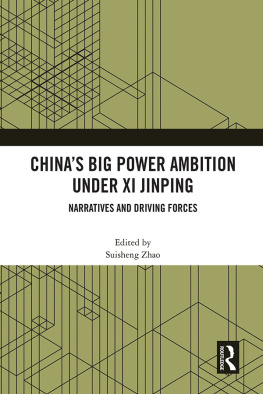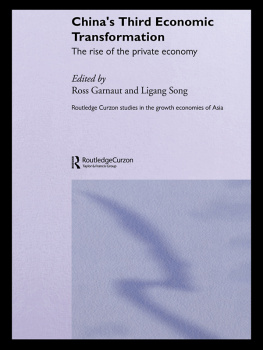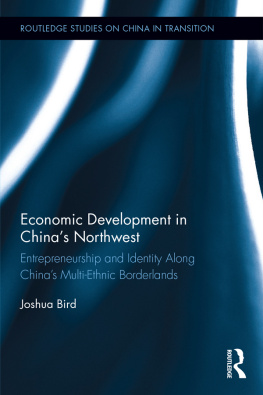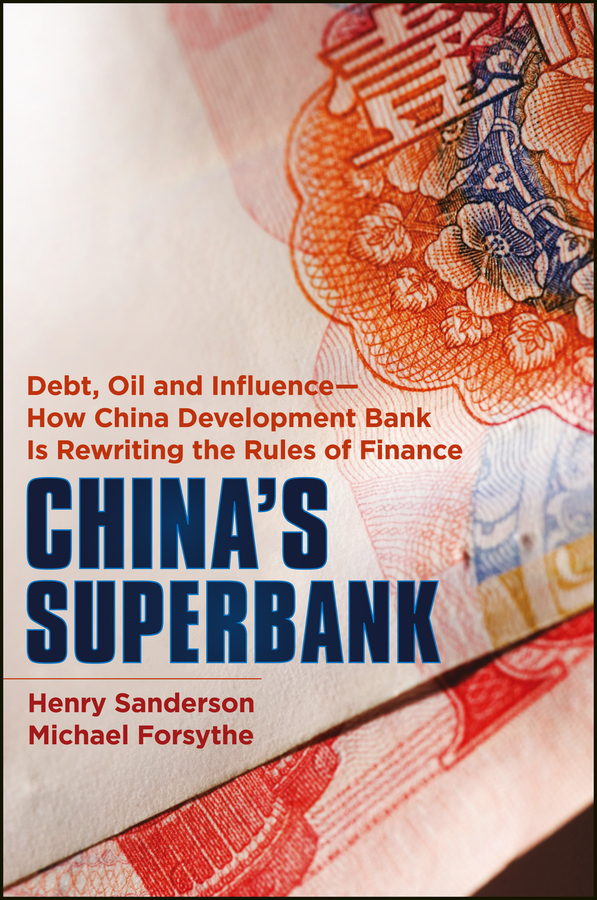Contents
Since 1996, Bloomberg Press has published books for financial professionals as well as books of general interest in investing, economics, current affairs, and policy affecting investors and business people. Titles are written by well-known practitioners, BLOOMBERG NEWS reporters and columnists, and other leading authorities and journalists. Bloomberg Press books have been translated into more than 20 languages.
For a list of available titles, please visit our Web site at www.wiley.com/go/bloombergpress .

Copyright 2013 by Henry Sanderson, Michael Forsythe.
Published by John Wiley & Sons Singapore Pte. Ltd.
1 Fusionopolis Walk, #07-01, Solaris South Tower, Singapore 138628
All rights reserved.
No part of this publication may be reproduced, stored in a retrieval system, or transmitted in any form or by any means, electronic, mechanical, photocopying, recording, scanning, or otherwise, except as expressly permitted by law, without either the prior written permission of the Publisher, or authorization through payment of the appropriate photocopy fee to the Copyright Clearance Center. Requests for permission should be addressed to the Publisher, John Wiley & Sons Singapore Pte. Ltd., 1 Fusionopolis Walk, #07-01, Solaris South Tower, Singapore 138628, tel: 6566438000, fax: 6566438008, e-mail: .
Limit of Liability/Disclaimer of Warranty: While the publisher and author have used their best efforts in preparing this book, they make no representations or warranties with respect to the accuracy or completeness of the contents of this book and specifically disclaim any implied warranties of merchantability or fitness for a particular purpose. No warranty may be created or extended by sales representatives or written sales materials. The advice and strategies contained herein may not be suitable for your situation. You should consult with a professional where appropriate. Neither the publisher nor the author shall be liable for any damages arising herefrom.
Other Wiley Editorial Offices
John Wiley & Sons, 111 River Street, Hoboken, NJ 07030, USA
John Wiley & Sons, The Atrium, Southern Gate, Chichester, West Sussex, P019 8SQ, United Kingdom
John Wiley & Sons (Canada) Ltd., 5353 Dundas Street West, Suite 400, Toronto, Ontario, M9B 6HB, Canada
John Wiley & Sons Australia Ltd., 42 McDougall Street, Milton, Queensland 4064, Australia
Wiley-VCH, Boschstrasse 12, D-69469 Weinheim, Germany
ISBN 978-1-118-17636-8 (Cloth)
ISBN 978-1-118-17639-9 (ePDF)
ISBN 978-1-118-17637-5 (Mobi)
ISBN 978-1-118-17638-2 (ePub)
Typeset in 11.5/14pt, Bembo by MPS Limited, Chennai, India

Preface
Hugo Chvez, resplendent in crisply pressed fatigues and paratrooper boots with red shoelaces, had a very special guest. Meeting him that mid-September day in Caracas was the worlds most powerful banker, who had lent Chvezs government at least $40 billion over four years, or about $1,400 for every man, woman, and child in Venezuela.
The guest, stooped and looking older than his 66 years, drank chrysanthemum tea, staring across the table at Chvez, bald from his chemotherapy treatments. He handed the president of the Bolivarian Republic of Venezuela a 600-page book filled with recommendations on how Chvez should run, manage, and build ports, roads, and railroads.
What bank in this day and age can lend so much money to one of the worlds riskiest regimes, a nation with two centuries of credit defaults, and then tell its debtor how to spend the proceeds of the loan?
Not Goldman Sachs. Chvezs banker had governmental ties that the legendary New York firm, incubator to US Treasury Secretaries Hank Paulson and Robert Rubin, could only dream of. The man sitting across from Chvez was the Chinese equivalent of royalty. His father was one of the founding fathers of the Peoples Republic of China. His company was banker to China Inc.
Not the World Bank. That Washington-based product of Pax Americana had a loan book only a fraction of the size of this mans company, the worlds biggest policy bank. Chvezs Chinese bank had bragging rights over the World Bank as well, having been front and center in crafting the biggest and arguably most successful poverty-reduction program in history that saw hundreds of millions of Chinese peasants become city dwellers. In Africa, the bank has funneled billions of dollars into the continent, stoking Ethiopian exports and reviving Ghanas railroad network after decades of neglect.
Not the Fed. The Federal Reserve Bank might have trillions of dollars at its disposal, and it might rightly be credited with staving off a depression in the wake of the 2008 financial meltdown. But when it comes to results, Chvezs bank arguably has an even more impressive record. The bank devised a system to fund local infrastructure projects that is credited with helping China sail through the global financial crisis while the United States and Europe stumbled.
Chvezs guest was Chen Yuan, chairman of China Development Bank (CDB), the worlds most powerful banker.
You cant buy shares in CDB: It is wholly owned by the Chinese government. But it would be a mistake to call it a government bureaucracy that is at the states beck and call. It is a bank, claiming the lowest nonperforming loan rate of any major Chinese lender and a reputation for hardball negotiations with both domestic and foreign clients. While other countries have long formed development banks to help fund their national companies and bolster economic growth to catch up to more advanced powers, the scale of CDB and the amount it can lend makes it a different animal.
But the worlds most powerful bank? Yes. Let us count the ways.
Exhibit 1: China. The bank wrote the manual for the biggest economic and urbanization boom in history, pioneering a system of lending to local government-backed companies that funneled more than $2 trillion across China to build roads, bridges, subways, and stadiums and was later used to stimulate growth when the world economy was crippled by the global financial crisis. The turnkey system it set up, beginning in 1998 in Anhui Province, meant that Chinese growth barely registered a hiccup while the United States went into the deepest economic crisis since the Great Depression. CDBs recently retired vice president, Gao Jian, is regarded as the father of Chinas bond market. CDB in one year sold more bonds than Chinas Ministry of Finance.
Exhibit 2: Africa. CDB lending is starting to move ahead of that of the World Bank and other international organizations, focused on building industry and infrastructure for the next stage of Africas growth and harnessing its biggest clients, Chinas elite state-owned companies, to do much of the work. While much of Chinese lending in Africa is focused on the extraction of oil and metals to fuel Chinas insatiable thirst for raw materials, in part driven by the banks funding of the nations urbanization, that is only part of the story. The banks private equity arm, the China-Africa Development Fund, is spurring the continents manufacturing as labor costs rise at home, helping transform Ethiopia into an exporter of leather and Chinese companies such as Chery Auto to open factories. In Ghana, CDB is financing roads, railroads, and an oil terminal and pipeline network with a $3 billion loan, the biggest in that countrys history, and guaranteeing Chinese companies will win most of the contracts.








